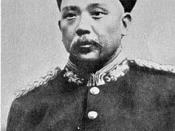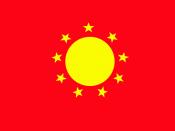The 1911 Revolution led by Dr. Sun Yat Sen is one of the most significant events in the history of China. It marked an end to the world's most remarkable span of imperial history, dating back 2133 years when Shi Huangdi first unified China (Gascoigne, 2003: 204). However, the change from autocratic monarchy to republic did not bring about the sort of fundamental political, social or cultural changes that one would normally expect from a revolution that smashed a 2000 year old feudal monarchy. Many scholars argue that the 1911 Revolution was not in fact a revolution at all. This statement is very much debatable, but conventional wisdoms asserts that the 1911 Revolution did not fulfil its potential.
Given these circumstances how true is the deeply held view that the political, cultural and social impacts of the May Fourth Movement were far more important than the 1911 Revolution? Mao Zedong was certainly amongst those who championed the role of the May Fourth Movement in the development of China, he wrote in January 1940: "Its outstanding historical significance is to be seen in a feature which was absent from the Revolution of 1911, namely its thorough and uncompromising opposition to imperialism as well as to feudalism" (Mao Ze Dong, 1940: x, quoted in Mackerras, 2006: 28-29).
In order to answer this question I will examine the significance of the 1911 Revolution and explain that these merely planted the seeds for a series of events of much greater historical significance, namely the May Fourth Movement, whose political, social and cultural influences had far greater immediate and long-term consequences.
However before examining the significance of the 1911 Revolution it is important to understand the political climate on which it was founded, by examining the collapse of the Qing dynasty. (Spence,


